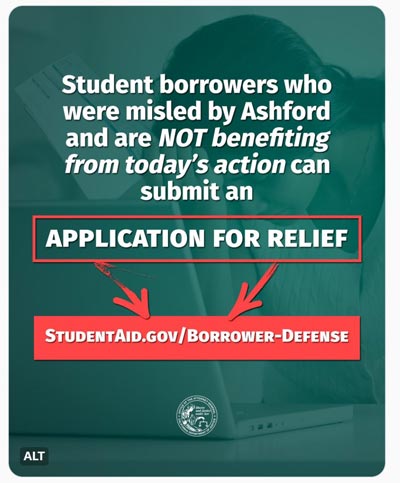Relief stems from evidence provided by the California Department of Justice during successful lawsuit brought against the college and its parent company
August 31, 2023 - OAKLAND – Joined by California Attorney General Rob Bonta, the Biden-Harris Administration on Wednesday 
“What Ashford University did to its students was unconscionable and illegal. That’s why the California Department of Justice took Ashford and its parent company to court. Ultimately, we prevailed, securing more than $22 million in penalties,” said Attorney General Bonta. “I want to thank the Biden-Harris Administration for changing the lives of thousands of former Ashford students today. They have lived a nightmare for too long. I encourage other individuals who took out federal student loans to attend Ashford, and were subject to its deceptive or misleading tactics, to apply for relief from the U.S. Department of Education as soon as possible.”
Borrowers will not have to make any payments on the loans being discharged. The Department will email borrowers who qualified for a borrower defense discharge in September that their applications have been approved. Borrowers will see any remaining loan balances for federal loans zeroed out and credit trade lines deleted. Any payments those borrowers made to the Department on their federal student loans will be refunded. Separately, the Department intends to initiate a recoupment proceeding at a later date to seek repayment of the liabilities associated with these approved claims.
“As the California Department of Justice proved in court, Ashford relied extensively on high-pressure and deceptive recruiting tactics to lure students,” said Under Secretary James Kvaal. “Today we are protecting the students who were cheated by Ashford, and we will also hold the perpetrators accountable, protect taxpayers, and deter future wrongdoing.”
The Department will also review the evidence to examine whether members of Ashford’s management and leadership took actions that violated Federal laws or regulations and threatened the integrity of the federal student financial aid programs. If the evidence shows they did, the Department may pursue appropriate remedies to enforce those rules.
In 2017, the California Department of Justice brought a lawsuit against Ashford and Zovio (which at the time was known as Bridgepoint Education) arguing that the for-profit college and its leadership engaged in numerous practices that misled and deceived prospective Ashford students. That suit led to an 18-day trial that featured nearly two dozen witnesses and more than 1,500 exhibits, plus additional written depositions.
On March 3, 2022, the court ruled in favor of the California Department of Justice, concluding that Ashford made more than 1.2 million misleading representations to prospective students nationwide and assessing a civil penalty of $22.3 million. As the judgment said, the “Court heard substantial evidence that over the last decade, Defendants created a high-pressure admissions department whose north star was enrollment numbers.” It found that “admissions counselors would cross a ‘gray line’ ethically or ‘do things they wouldn’t normally do’ to boost numbers to keep their jobs.” The court found that executives’ testimony that Ashford “always put students first” lacked credibility. In fact, the court described a “paper trail [showing] that company executives were well aware of [the admissions department’s] fear-based culture.”
The penalty assessed is the subject of an ongoing appeal, but Zovio did not challenge the court’s findings about the underlying conduct. As established by the court and verified through the Department’s independent review of the evidence, Ashford and Zovio engaged in extensive substantial misrepresentations:
- Ashford recruiters told students they would be able to work as teachers, social workers, nurses, or drug and alcohol counselors. But Ashford never obtained the necessary state approval and/or accreditation for students to enter these professions, meaning students wasted years of their lives and incurred tens of thousands of dollars of debt for degrees they could not use.
- Ashford recruiters also lied about the cost to attend Ashford, the amount and type of financial aid students would receive, and the amount of debt students would accumulate. For instance, before they had access to borrowers’ financial aid award information some recruiters told prospective students that they would not incur out-of-pocket costs, that every Ashford student qualified for Federal Pell Grants, or that loan payments would be $50–$75 per month. Borrowers later discovered these promises were untrue when, for example, they unexpectedly reached lifetime loan limits during their enrollment, unexpectedly incurred out-of-pocket costs, and were forced to withdraw with debt but no degree.
- Ashford recruiters misled students about how long it would take to obtain an Ashford degree by stating its bachelor’s programs were “accelerated” or by comparing Ashford’s bachelor’s programs to traditional four-year schools when, in fact, Ashford’s bachelor’s degree programs were structured to take five academic years to complete.
- Ashford recruiters misled students about the ability to transfer credits both into Ashford and out of Ashford. Recruiters told students that Ashford would accept previously earned credits, reducing the amount of time and money students would spend completing their degrees. Students would later learn only some of the promised credits actually transferred. Ashford recruiters also promised students that the credits they earned at Ashford would transfer to other universities, when this was not always true.
Borrowers relied upon these substantial misrepresentations to their detriment. Additionally, the evidence from the California case demonstrated that three-quarters of all Ashford bachelor’s degree programs would have resulted in a negative value for students, making the education they obtained effectively worthless. The Department approved these findings prior to July 1, 2023, and this action covers loans under the 1995 or 2016 regulation, as applicable.
Three years into the California lawsuit, on Aug. 3, 2020, the University of Arizona announced a plan for its affiliated foundation to acquire Ashford University and turn it into the University of Arizona Global Campus (UAGC). The University of Arizona acquired direct ownership of UAGC at the end of June 2023.
Source: CA. DOJ








